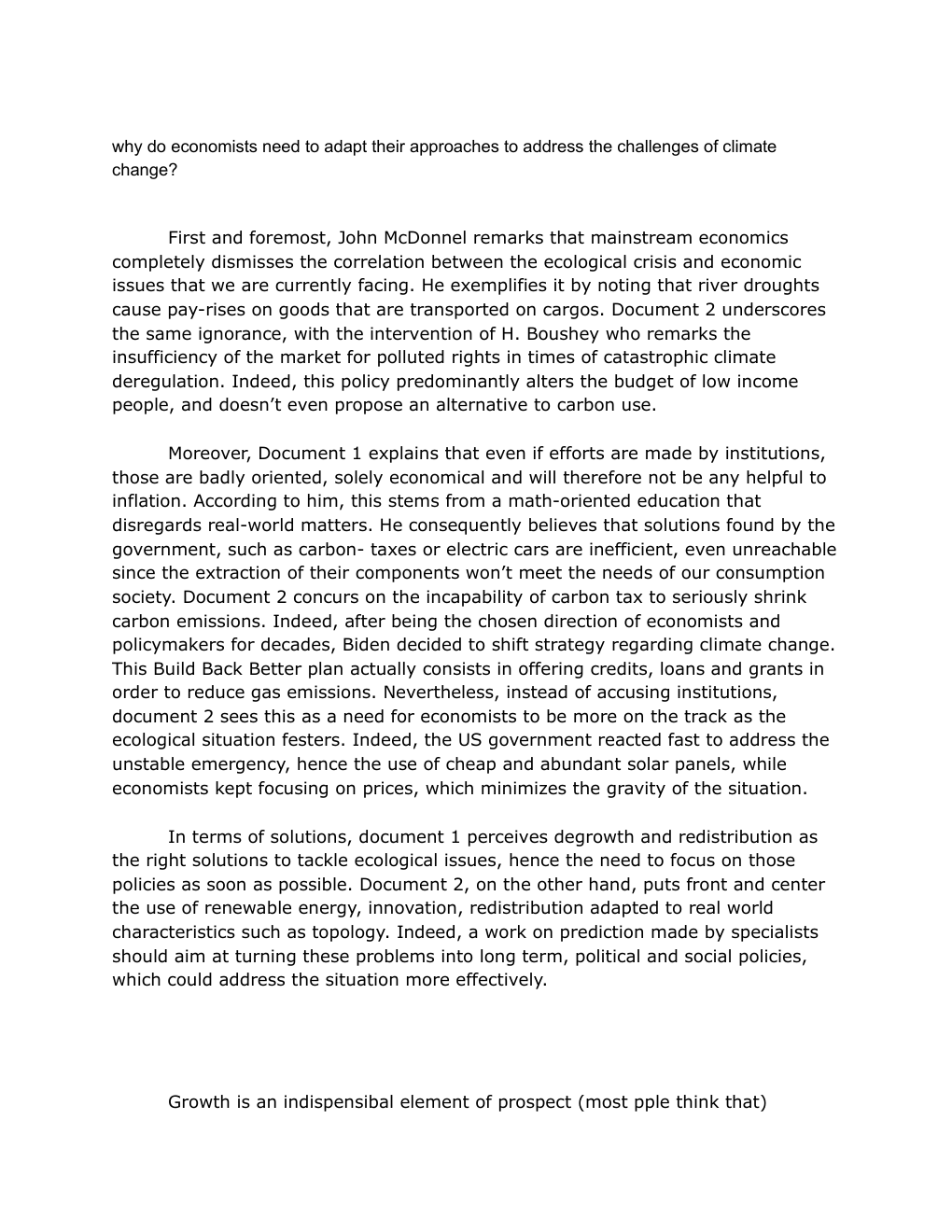cours d'anglais: why do economists need to adapt their approaches to address the challenges of climate change?
Publié le 28/03/2024
Extrait du document
«
why do economists need to adapt their approaches to address the challenges of climate
change?
First and foremost, John McDonnel remarks that mainstream economics
completely dismisses the correlation between the ecological crisis and economic
issues that we are currently facing.
He exemplifies it by noting that river droughts
cause pay-rises on goods that are transported on cargos.
Document 2 underscores
the same ignorance, with the intervention of H.
Boushey who remarks the
insufficiency of the market for polluted rights in times of catastrophic climate
deregulation.
Indeed, this policy predominantly alters the budget of low income
people, and doesn’t even propose an alternative to carbon use.
Moreover, Document 1 explains that even if efforts are made by institutions,
those are badly oriented, solely economical and will therefore not be any helpful to
inflation.
According to him, this stems from a math-oriented education that
disregards real-world matters.
He consequently believes that solutions found by the
government, such as carbon- taxes or electric cars are inefficient, even unreachable
since the extraction of their components won’t meet the needs of our consumption
society.
Document 2 concurs on the incapability of carbon tax to seriously shrink
carbon emissions.
Indeed, after being the chosen direction of economists and
policymakers for decades, Biden decided to shift strategy regarding climate change.
This Build Back Better plan actually consists in offering credits, loans and grants in
order to reduce gas emissions.
Nevertheless, instead of accusing institutions,
document 2 sees this as a need for economists to be more on the track as the
ecological situation festers.
Indeed, the US government reacted fast to address the
unstable emergency, hence the use of cheap and abundant solar panels, while
economists kept focusing on prices, which minimizes the gravity of the situation.
In terms of solutions, document 1 perceives degrowth and redistribution as
the right solutions to tackle ecological issues, hence the need to focus on those
policies as soon as possible.
Document 2, on the other hand, puts front and center
the use of renewable energy, innovation, redistribution adapted to real world
characteristics such as topology.
Indeed, a work on prediction made by specialists
should aim at turning these problems into long term, political and social policies,
which could address the situation more effectively.
Growth is an indispensibal element of prospect (most pple think that)
Various models developped by economist all point to ways to maximize it
==> economy of a country turned into equations ==> the one who inegrate
environmental, social aspects are marginalists
Should we look at it the same way
Culturally speaking, the isolationism of economics has proved to be a
civilisational disaster ==> how do we switch to another way
==> it involves questioning some of the fundamentals of how eco are
seen and applied.
Growth is a central pb, a central qu° ==> job of economists and
governments should be to maximize growth
It comes out w/ reistences across the world for many reasons ==>
civilational ad culture reasons: ever since the indus rev, technological pb has
resulted in more comfort, easier acces to commodities, goods, objects, food, clothe
=> since the dawn of the indus rev, humanity (western countries) has associated
human progress w/ making life easy, having access to more ressources, being able
to harvest more energy, being able to extract more gas, oils, minerals… ==> strong
association between human progress and increasing concumption
Shift of indus rev pushed western societies into modernity was indissossiable
w/ fossil fuels ==> difficulty in adressing climate change is that is does not simply
rely on pol direction but also on profound civilisational changes
EX: in amerca post WW2, massive expansion of suburban life (individual
houses around big cities) ==> could only happen where acces to automobiles ad
petrol available to all
==> democratic ideal of being able to have a car…(American way of life )
could not be separated from the autommobile industry and oil ==> envisaged as an
incarnation of political freedom as understood by amrrcians for centuries (Pursuit of
happiness written in the consitution)
Pol climate action should be connected w/ state intervention (timelie of
climate economic in america shows a constant back and forth regarding action for
climate change linked to republicans VS democrats)
Republicans have defended the American way of life ==> having a suburban
life, having a car, consuming a lot
PAC: political action comitees ==> fund , channel donations from various
sources in order to support a caus eor a politician....
»
↓↓↓ APERÇU DU DOCUMENT ↓↓↓
Liens utiles
- exposé anglais introduction to the Consumer Society
- Fiche de lecture sur le chapitre 11: The Greek of the New Testament, par Mark Janse, sur la section IV de l’ouvrage, intitulé: Ancient Greek: structure and change, pages 646-653.
- Dam collapse Brumadinho (écrit en anglais dans le cadre d'un cours)
- Cours en anglais
- LE DISCOURS D’UN ROIFrançais Anglais In the first instance, i’m going to recapitulate the movie for those of you who don’t know.

































